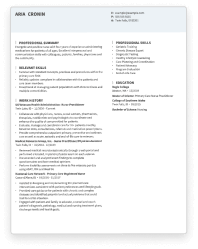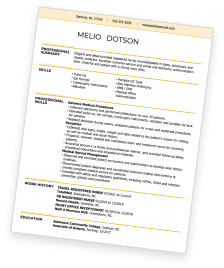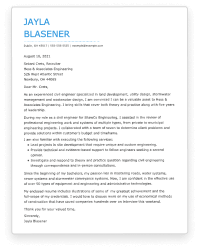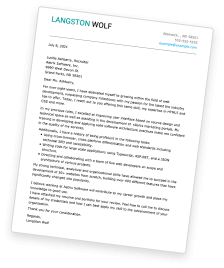Nanny Resume: Overview
As a nanny, you are more than just a caregiver; you are an integral part of a child’s development and a cornerstone of the family’s daily life.
Your role encompasses a wide range of responsibilities, from ensuring the safety and well-being of children to fostering their educational and social growth, and your duties can extend to:
- In-home Childcare
- Educational Activities and Tutoring
- Meal Preparation and Nutrition Planning
- Schedule and Routine Development
- Emotional Support and Guidance
Creating a standout resume for a nanny position is the first step toward securing a job that matches your skills and passions.
Our carefully crafted resume templates and professional examples are designed to showcase your experiences, qualifications, and the unique value you bring to a family.
Let’s embark on this journey together to highlight your role not just as a nanny but as a cherished member of the family unit!
Nanny Resume: Choose A Format
Creating an effective nanny resume starts with selecting the best format that showcases your qualifications in a captivating way, ensuring you stand out among other candidates.
There are three main types of resume formats for nannies to consider:
Chronological Resumes for Nannies
The chronological resume format is highly recommended and popular, focusing predominantly on the applicant’s relevant professional experience.
As a nanny, you would list all pertinent work history, including previous nanny positions, childcare roles, or any relevant volunteer work.
Each position should include a comprehensive description of your responsibilities and accomplishments, along with your job title, the name of the employer, location, and dates of employment.
Responsibilities and achievements should be detailed in bullet points, employing strong action verbs and quantifiable outcomes to provide unique insights into your qualifications.
This format is also compatible with Applicant Tracking Systems (ATS), enhancing your resume’s visibility during the screening process.
Functional Resumes for Nannies
Functional resumes are skill-focused, ideal for candidates who may lack direct experience in the role they are applying for.
If you’re transitioning into childcare from another field, or if you’re a new entrant into the professional world, a functional resume allows you to highlight the skills acquired through other experiences that are applicable to a nanny position.
Though this format can effectively showcase your skills, it’s worth noting that it may not align as well with the preferences of some employers or ATS, which tend to prioritize work experience.
Combination Resumes for Nannies
A combination resume melds the chronological and functional formats, giving equal weight to both skills and experience.
This can be particularly advantageous for nannies, allowing you to showcase your practical skills alongside your work history.
This format can be beneficial if you have a mix of relevant skills and some experience, enabling you to highlight how both contribute to your suitability as a nanny.
Choosing a Resume Format
Selecting the right resume format is a crucial step in the writing process. The chronological format is often recommended for its emphasis on work history and compatibility with ATS.
However, the best format for you depends on your unique circumstances and experiences.
Even if your previous jobs don’t seem directly related to childcare, think about the transferable skills that demonstrate your capabilities as a nanny.
Whether it was through coordinating activities, managing schedules, or providing educational support, these experiences can underscore your qualifications for the nanny role.
Reflect on how each job helped you build relevant skills, like effective communication, conflict resolution, and adaptability, which are essential in a childcare setting.
How To Write A Nanny Resume
After selecting the ideal format for your nanny resume, the next step of knowing how to write your resume is quite straightforward but crucial.
Your resume outline should encompass five essential sections, with the option to include additional sections that further enhance your qualifications and experiences.
These critical sections of a nanny’s resume are:
- Contact Information
- Summary or Objective
- Work History
- Skills
- Education
Each section is integral to presenting yourself as the ideal candidate for a nanny position and setting the stage for your professional journey.
Contact Information
The contact information section of your resume should include your full name, phone number, a professional email address, and your location (city and state).
If applicable, you can also add your LinkedIn profile or a link to an online portfolio that showcases your experience and skills in childcare.
It’s essential to place your contact information prominently at the top of your resume, ensuring it’s easily noticeable and readable.
While it should be formatted to make your name stand out and be memorable, it should not detract from the overall content of your resume.
Here’s an example of how the contact information might look for a nanny resume:
Jane Doe
Los Angeles, CA
jane.doe@email.com
555-123-4567
Summary or Objective
Directly below your contact information, include a profile section to introduce yourself to the reader.
This can take the form of either a resume summary or an objective, depending on your professional background and preferences.
A resume summary offers a concise overview of your key skills, experiences, and career aspirations, making it ideal for individuals with a substantial work history.
For a nanny, a compelling summary might look like this:
“Compassionate and dependable nanny with over 8 years of experience caring for children of various ages. Renowned for creating engaging and educational activities that promote children’s developmental milestones. A trusted caregiver who has consistently exceeded parental expectations and contributed to a loving and nurturing environment. Eager to bring my dedication and child care skills to a new family.”
An objective statement, on the other hand, is more focused on your goals and enthusiasm for the nanny position, particularly suitable if you have less experience.
A strong objective for a nanny could be:
“Enthusiastic and nurturing aspiring nanny with a strong educational background in early childhood development. Possesses hands-on experience through extensive babysitting for family and friends and volunteer work at local preschools. Committed to fostering a safe, fun, and educational environment for children to explore and grow. Seeking to leverage my passion and knowledge to support a family seeking comprehensive childcare support.”
Regardless of which option you choose, this profile section is your opportunity to highlight the most relevant skills and experiences that match the nanny job description.
Tailoring this part of your resume to include key terms found in the job listing can significantly increase your resume’s visibility to both ATS and potential employers, paving the way for the rest of your resume to be reviewed.
Work History
The “Work History” section of your nanny resume is pivotal in illustrating your relevant experiences and capabilities.
Employers seek concrete evidence of your childcare skills and accomplishments, making it crucial to detail your professional journey effectively.
Begin with your most recent job and work backward, prioritizing roles that have direct relevance to the nanny position you’re eyeing.
This strategic alignment will enhance your candidacy, so it’s important to emphasize responsibilities and achievements that underscore your aptitude for the role.
Employ dynamic action verbs to convey progression and responsibility, and where possible, quantify your successes with numbers or percentages.
Metrics lend credibility to your accomplishments, offering tangible proof of your impact and setting you apart by highlighting your unique contributions.
Here’s an example of how the work history section on a nanny resume might look:
Personal Nanny
The Smith Family, Springfield, IL
06/2020 – Present
- Orchestrated daily schedules incorporating educational activities, leading to marked improvements in children’s reading and math skills.
- Implemented a structured routine that reduced tantrums by 40% and increased daily nap consistency.
- Prepared and maintained healthy meal plans, accommodating dietary restrictions and allergies, resulting in 100% adherence to dietary guidelines.
- Fostered a positive environment conducive to emotional and social development, praised by parents for noticeable improvements in children’s behavior and social interactions.
- Coordinated with parents to establish and maintain a seamless communication system, ensuring they were informed and involved in all aspects of their children’s care.
This example demonstrates how to effectively showcase your nanny experiences, emphasizing the impact of your actions through specific achievements and responsibilities.
Skills
Your nanny resume’s skills section is a critical component that showcases the hard and soft skills you bring to the position.
Like the work history section, prioritize skills directly relevant to the job, demonstrating a balance of technical and interpersonal abilities.
Here are some of the most sought-after hard skills and soft skills for nannies, reflecting the comprehensive role you play in children’s lives:
Top 5 Hard Skills for Nanny Resumes
- Child Development Knowledge: Understanding the milestones and development stages of children to provide age-appropriate care and activities.
- Safety and First Aid: Being certified in first aid and CPR, along with knowledge of childproofing and maintaining a safe environment.
- Nutrition and Meal Preparation: Ability to plan and prepare healthy meals that cater to dietary needs and preferences of children.
- Educational Activities Planning: Designing and executing educational and developmental activities that support learning and growth.
- Behavioral Management Techniques: Implementing effective strategies for managing behavior and fostering positive conduct.
Top 5 Soft Skills for Nanny Resumes
- Patience: Essential for calmly handling the dynamic and sometimes challenging behaviors of children.
- Adaptability: Quickly adjusting to changes in schedules, family needs, and unexpected situations with a positive attitude.
- Communication: Clear and effective communication with both children and parents to ensure a cohesive caregiving approach.
- Empathy and Compassion: Understanding and responding to the emotional needs of children, providing a nurturing environment.
- Organizational Skills: Managing daily activities, schedules, and routines efficiently, ensuring smooth operation of family life.
Incorporating these skills into your resume might look something like this:
Skills
- Child Safety and First Aid: Certified in CPR and First Aid; experienced in creating a safe play environment.
- Nutritional Meal Planning: Proficient in preparing nutritious, child-friendly meals with attention to dietary restrictions.
- Educational and Developmental Activities: Skilled in organizing educational games and activities that promote cognitive and physical development.
- Behavior Management: Effective in implementing positive discipline techniques; experienced in managing tantrums and fostering good habits.
- Communication and Patience: Excellent at communicating with children at different developmental stages and maintaining patience during challenging situations.
Tailoring your skills section to reflect these competencies can significantly bolster your resume, highlighting your capability to fulfill the multifaceted role of a nanny.
Education
The education section of your nanny resume should detail your highest level of education, including the degree obtained, the name of the institution, and its location.
You may also opt to include your graduation date, relevant coursework, honors, or certifications achieved during your studies.
Given the unique nature of nanny roles, which may not always require formal education in early childhood development but highly regard it, you should tailor this section to highlight your most pertinent educational achievements.
Here’s an example of how to present your education on a nanny resume:
Bachelor of Science in Early Childhood Education
University of Washington, Seattle, WA
Additional Sections
Consider adding extra sections to your nanny resume if they present relevant information succinctly without overcrowding your resume.
These sections can spotlight your qualifications and distinguish you from other candidates.
For a nanny, additional sections might include:
- Certifications: Highlight any certifications relevant to childcare, such as CPR and First Aid, Childcare Provider Certification, or a Child Development Associate (CDA) credential.
- Volunteer Experience: Include volunteer work that demonstrates your commitment to child development and welfare, such as volunteering at local schools, community centers, or non-profit organizations focused on children.
- Professional Associations: Membership in professional organizations like the International Nanny Association (INA) can underscore your dedication to the profession and awareness of industry standards.
- Awards and Honors: Any recognition related to your work as a nanny or in fields of child care and education can be compelling evidence of your exceptional abilities.
- Relevant Hobbies: Listing hobbies that enrich your role as a nanny (e.g., crafting, music, sports, or second-language proficiency) can offer insight into your personality and additional skills you bring to a family.
Incorporating these sections where appropriate can make your resume more dynamic and reflective of your comprehensive skill set, thus making you a more attractive candidate for the role.
Top Certifications For Nannies
Certifications are a key aspect of a nanny’s resume, enhancing your qualifications and demonstrating your commitment to providing high-quality childcare.
Here are some valuable certifications for nannies:
- CPR and First Aid Certification: These certifications are fundamental for nannies, ensuring you can respond effectively to emergencies and provide basic first aid.
- Child Development Associate (CDA) Credential: Recognized in the childcare profession, the CDA credential demonstrates knowledge in child development and readiness to work with young children. It covers toddlers, preschoolers, and infants.
- Newborn Care Specialist Certification (NCS): For those specializing in infant care, this certification provides in-depth knowledge on newborn care, including sleep training, nutrition, and lactation support.
- International Nanny Association (INA) Credentialed Nanny: The INA offers a credential exam that tests a nanny’s practical knowledge of child care. Passing this exam demonstrates a high level of professionalism and understanding of child development and family dynamics
Holding these certifications not only showcases your dedication to your role as a nanny but also assures parents of your competence and commitment to safety and quality childcare.
They can significantly enhance your resume, making you a more attractive candidate to prospective employers. Just make sure they are relevant to the nanny job description.
8 Tips For Writing A Nanny Resume
Tailor Your Resume: Customize your resume for each position by highlighting experiences and skills that align with the family’s needs and the specifics of the job posting. This shows you’ve taken the time to understand their requirements.
Use Action Verbs: Employ dynamic action verbs to describe your childcare responsibilities and achievements. Words like nurtured, organized, implemented, and fostered add life to your resume and clearly communicate your contributions.
Highlight Achievements: Instead of just listing duties, focus on your accomplishments with the children and families you’ve worked for. Quantify these achievements when possible, such as by noting improvements in children’s academic performance or behavioral changes.
Include Relevant Keywords: Scan the job listing for keywords and phrases related to childcare, and incorporate them into your resume. This will help your resume pass through Applicant Tracking Systems (ATS) and catch the eye of the family or agency.
Emphasize Child Development Skills: Demonstrate your understanding of child development stages and your ability to engage children in age-appropriate activities that promote their growth.
Mention Specialized Skills: If you have skills in areas like special needs care, bilingual communication, or early childhood education, make sure to highlight these. They can make you a more attractive candidate for certain positions.
Detail Your Educational Background: Even if you don’t have a degree in early childhood education, include any relevant coursework, workshops, or certifications that enhance your childcare expertise.
Proofread for Perfection: Ensure your resume is meticulously proofread to avoid any spelling or grammar mistakes. A well-polished resume reflects your professionalism and attention to detail, qualities every parent or guardian values in a nanny.


Use Hloom's Resume Builder
Key Takeaways
- Being a nanny involves much more than just childcare; it includes fostering educational development, emotional support, and creating a safe and nurturing environment. Highlighting these varied responsibilities on your resume is crucial.
- Opt for a resume format that best showcases your strengths. While a chronological format is recommended for its focus on work experience, consider a functional or combination format if they better represent your qualifications.
- Including relevant certifications, such as CPR and First Aid or a Child Development Associate (CDA) credential, can significantly bolster your credibility as a professional nanny.
- Emphasize both your hard and soft skills, along with quantifiable achievements, to demonstrate your comprehensive childcare capabilities.
- Customize your resume for each job application to align with the specific needs of the family or agency. Use relevant keywords from the job description to ensure your resume is ATS-friendly and stands out to potential employers.
Use Hloom's Cover Letter Builder














